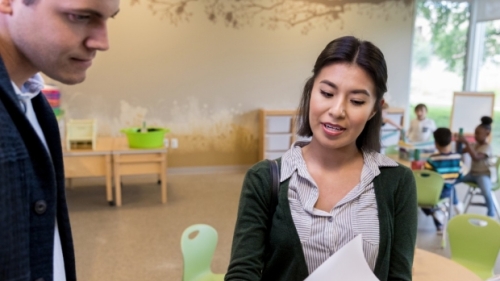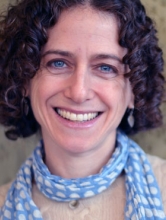Researchers at New York University’s Steinhardt School find that a combination of formal and informal professional development for early childhood educators has the potential to strengthen New York City’s early care and education workforce.

Photo credit: SDI Productions
New research by New York University finds that a combination of formal and informal professional development (PD) for early childhood educators has the potential to strengthen New York City’s early care and education (ECE) workforce.
As part of a larger study, researchers Elise Cappella and Travis Cramer analyzed how formal and informal PD is sought by ECE professionals, and how advice-seeking impacts educators’ experiences and beliefs. In addition, they explored perceptions of district-led professional learning initiatives and how the resulting knowledge is passed along to peers.
Early childhood teachers who sought advice and learning from peers at their schools were found to have higher levels of job satisfaction, greater confidence in their teaching, and a stronger belief that colleagues can effectively work together to support children and their families. While formal and informal PD were found to have positively influenced teacher well-being, informal advice-seeking from peers emerged as an overlooked resource.
“Our research shows that professional learning for early childhood educators is not only top-down, but across peers,” says Cappella, vice dean for research and associate professor of applied psychology at NYU Steinhardt. “Early childhood teachers seek out counsel from their colleagues based on relationships and trust and this should be recognized as an important part of their professional development and a mechanism to strengthen classroom quality.”
Teaching assistants were found to be a strong but undervalued resource in helping peers at all levels understand how to better connect with the diverse children and families they serve. When staff seek advice from peers, more are likely to seek advice from lead teachers rather than assistants, evidencing a lost opportunity to build greater cultural competency across educators. The racial/ethnic identities and immigration status of teaching assistants more closely match the students in their districts than that of lead teachers. This can provide greater linguistic diversity and advance cultural understanding, further strengthening teachers’ ability to support quality early learning for children.
Informal advice-seeking and sharing also extend to formal PD and spreading the knowledge it imparts. Teachers benefited more from formal PD sessions when they had a personal connection to the lesson and when it was relevant to their needs, settings, and experiences. Early childhood staff reported that they would pass along formal PD learnings to colleagues in both formal and informal settings. This spread professional expertise and specific content knowledge, largely due to trust, friendship, and the perceived value of building peer support.
The researchers emphasize that making space for peer-to-peer learning and advice-seeking should be a priority for ECE programs. Catalyzing learning and PD from the top is important, but the PD that happens through peer interactions is also critical. Non-teaching-related burdens must be relieved to make time for less structured interactions that impart knowledge and support to colleagues.
Furthermore, three times as many staff seek advice from lead teachers in comparison to assistant teachers. While the study findings emphasize the importance of advice-seeking from assistant teachers as a valuable resource, it is still critical to ensure that lead teachers are well-prepared and have the capacity to engage with other teachers and staff. As highly respected colleagues, lead teachers are uniquely able to impart knowledge and advice. In addition, most teachers seek advice from their school or program leaders about a range of topics, including assessment and instruction, classroom management, and family engagement. Given the central role leaders play in formal and informal support to teachers, it is critical to provide opportunities for leaders to maintain and gain knowledge as well as time to provide advice and support to their teachers.
“The key is often allowing staff to interact and giving them the time to do it,” says Cramer, one of the researchers and a docotoral candidate in the psychology and social intervention program at NYU Steinhardt. “Informal interactions shouldn’t take the place of formal professional development, but it’s an important way for people to learn from each other and build a support system. These critical opportunities are reduced because of COVID-19 and the remote learning environment—even formal professional learning opportunities are limited right now, and we must find a way to create these opportunities for ECE staff in the current climate. We’re missing the in-between connections that create support systems for our early childhood teachers.”
The larger study, Pre-K for All in NYC: Role of Teachers’ Advice Networks, was led by LaRue Allen, Elise Cappella, Pamela Morris-Perez, and Cybele Raver at New York University's Institute of Human Development and Social Change. This research was made possible by The New York City Early Childhood Research Network, a unique partnership of researchers from the city’s higher education institutions who work with the New York City Department of Education, New York City Administration for Children’s Services, New York City Department of Health and Mental Hygiene and the Mayor’s Office for Economic Opportunity to study the implementation of New York City’s early childhood system and use the knowledge gained to improve instruction and outcomes for all children. This study was funded by the Foundation for Child Development. The New York City Early Childhood Research Network is a project of the New York Early Childhood Professional Development Institute at the City University of New York and is funded by Early Childhood Partners NYC, Foundation for Child Development, Heising-Simons Foundation, and the W. Clement & Jessie V. Stone Foundation.


